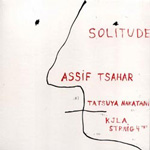Home » Jazz Articles » Album Review » Assif Tsahar / Tatsuya Nakatani / KJLA String 4tet: Solitude
Assif Tsahar / Tatsuya Nakatani / KJLA String 4tet: Solitude
Out of the nine tracks on Solitude, eight are group improvisations, and the title track that concludes this disc is a Duke Ellington standard. The first track, the tender "Love Is," sets the dark tone for this release. Tsahar's somber bass clarinet soars over Nakatani's murmuring bells and the drone of the strings. The sonorities on the longest track, "Unmoving," are more abstract, and the strings sometimes sound as if they are imitating overtone throat-singing. They add to Tsahar's breathy blowing on the tenor sax and Nakatani's distant drumming until all the tension climaxes in muscular interplay. "Sand Between a Toe" is more playful and the sax and strings play a sort of hide-and-seek game.
The tone poem "The Epistemology of Loss" (dedicated to poet John Berryman, after one of his well-known poems, "The Ball Poem") and the following track, "Of Amazing Most Now" (dedicated to poet e.e. cummings, after his famous poem "i thank You God for most this amazing"), are dense contemplations that capture the realization of loss in the Berryman poem and cummings' sensory bewilderment.
"Blue Sun" retains the same tense, dark atmosphere. The tones become more clearer on "Falling," where Nakatani's tap drumming interlocks with the pizzicato strumming of the strings while Tsahar's bass clarinet navigates the turmoil into more coherent lines. Only then does violinist Audrey Chen manage to stand out with her exceptional technique. This continues on the free-improv "By and By," where all the members of the string quartet are much more prominent. The strings on Ellington's "Solitude" sound a bit dry and detached, but Tsahar contrasts this deficiency with a rich and soulful tone.
Solitude managse to draw a cohesive aesthetic that is very similar in spirit to earlier high-energy efforts by Tsahar, with more colors and shades, more control over expressiveness—but still same intelligence and passion. It may demand more from the listener, but it guarantees an exceptional reward.
Track Listing
Love Is; Unmoving; Sand Between a Toe; The Epistemology of Loss (for John Berryman); Of Amazing Most Now (for e.e. cummings); Blue Sun; Falling; By and By; Solitude.
Personnel
Assif Tsahar: reeds; Tatsuya Nakatani: percussion; Kate Hernandez: violin; Jean Cook: violin; Ljova: viola; Audrey Chen: cello.
Album information
Title: Solitude | Year Released: 2006 | Record Label: Hopscotch Records
< Previous
Outtakes 1978
Next >
Paul Motian: ECM Recordings
Comments
About Assif Tsahar / Tatsuya Nakatani / KJLA String 4tet
Related Articles | Concerts | Albums | Photos | Similar ToTags
For the Love of Jazz
 All About Jazz has been a pillar of jazz since 1995, championing it as an art form and, more importantly, supporting the musicians who create it. Our enduring commitment has made "AAJ" one of the most culturally important websites of its kind, read by hundreds of thousands of fans, musicians and industry figures every month.
All About Jazz has been a pillar of jazz since 1995, championing it as an art form and, more importantly, supporting the musicians who create it. Our enduring commitment has made "AAJ" one of the most culturally important websites of its kind, read by hundreds of thousands of fans, musicians and industry figures every month.



















